[fblike]
 For the last thirty-two years Turkey has been in conflict with Kurdish separatists. These separatists, of which the Kurdistan Workers’ Party (PKK) is most prominent, desire to create an autonomous Kurdish republic, arguing that Turkey represses Kurdish culture. In fact, the Kurds are the world’s largest ethnic group that lacks a state, with peoples scattered across Iraq, Iran, Turkey, and Syria. Since 1984, the conflict has claimed the lives of over 20,000 soldiers and civilians and although some Turkish governments have attempted to solve the conflict, either to create more domestic stability or win favor with the European Union (EU), the conflict has resumed due to disputes over Turkey’s handling of the Islamic State and the Turkish government’s crackdown on Kurdish activists. Human Rights Watch has criticized both sides for violating the rights of civilians and combatants, and ending the conflict is in the Turkish government’s best interest for the sake of its international reputation and economy.
For the last thirty-two years Turkey has been in conflict with Kurdish separatists. These separatists, of which the Kurdistan Workers’ Party (PKK) is most prominent, desire to create an autonomous Kurdish republic, arguing that Turkey represses Kurdish culture. In fact, the Kurds are the world’s largest ethnic group that lacks a state, with peoples scattered across Iraq, Iran, Turkey, and Syria. Since 1984, the conflict has claimed the lives of over 20,000 soldiers and civilians and although some Turkish governments have attempted to solve the conflict, either to create more domestic stability or win favor with the European Union (EU), the conflict has resumed due to disputes over Turkey’s handling of the Islamic State and the Turkish government’s crackdown on Kurdish activists. Human Rights Watch has criticized both sides for violating the rights of civilians and combatants, and ending the conflict is in the Turkish government’s best interest for the sake of its international reputation and economy.
This topic brief will provide some important vocabulary on the Turkish-PKK conflict, sources of tensions that exist between the two sides, and the implications of the conflict for Turkey domestically and internationally.
Readers are also encouraged to use the links below and in the related R&D to bolster their files about this topic.
Note: With the National Speech and Debate Association (NSDA) National Tournament taking place next week, this will be the last topic brief for the 2015-2016 season. Thank you for subscribing to Extemp Central’s premium content for this school year.



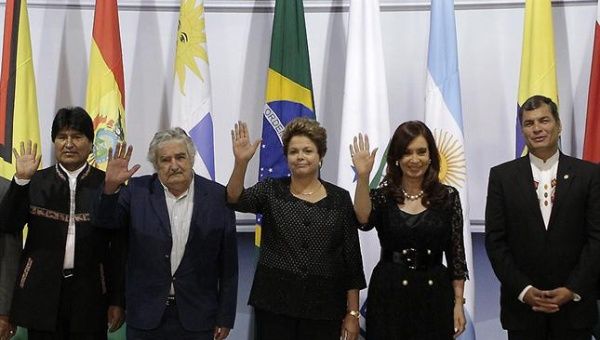 For the past decade and a half, leftist politicians in Latin America were elected at a higher rate than their conservative counterparts. These leftist leaders, which included Venezuela’s Hugo Chavez, Brazil’s Luiz Ignacio Lula da Silva, Bolivia’s Evo Morales, and Argentina’s Cristina Fernandez de Kirchner, all campaigned on promises of enlarging the welfare structures of their respective states and some, including Chavez and Morales, made moves to nationalize elements of the national economy to better distribute resource wealth to their people. However, falling global demand for commodities, in addition to corruption scandals and poor policy decisions, have created a gradual backlash against leftist leaders in the region. Whereas once it was great to rail against “neoliberal” economic policies and American influence, voters in Latin America have begun to give free market, conservative leaders an audience due to economic downturns, anxieties about the fiscal soundness of some Latin American nations, and shortages of vital consumer goods (notably in Venezuela).
For the past decade and a half, leftist politicians in Latin America were elected at a higher rate than their conservative counterparts. These leftist leaders, which included Venezuela’s Hugo Chavez, Brazil’s Luiz Ignacio Lula da Silva, Bolivia’s Evo Morales, and Argentina’s Cristina Fernandez de Kirchner, all campaigned on promises of enlarging the welfare structures of their respective states and some, including Chavez and Morales, made moves to nationalize elements of the national economy to better distribute resource wealth to their people. However, falling global demand for commodities, in addition to corruption scandals and poor policy decisions, have created a gradual backlash against leftist leaders in the region. Whereas once it was great to rail against “neoliberal” economic policies and American influence, voters in Latin America have begun to give free market, conservative leaders an audience due to economic downturns, anxieties about the fiscal soundness of some Latin American nations, and shortages of vital consumer goods (notably in Venezuela). Although the Cold War has been over with for decades one of its proxy conflicts persists. The Korean Peninsula today remains divided between a democratic, capitalist South Korea and a totalitarian, communist North Korea, with both sides technically still at war since an armistice ended the Korean War from 1950-1953. The United States still bases more than 30,000 troops in South Korea, anticipating a North Korean attack due to threats made by current and past leaders, notably King Jong-un and his father Kim Jong-il. What makes North Korea’s bellicose rhetoric concerning is that it has enhanced its nuclear capabilities since the 1990s. The international community has worked to punish the North for this activity, but the regime has persisted and analysts worry that its missile technology is steadily improving, with some worrying that one day the North might have the ability to target Hawaii, Alaska, or the West Coast of the United States. Nevertheless, are worries about North Korea, a regime that struggles to feed its own people, justified? It is not uncommon for extempers to make such calculations in rounds concerning East Asia or foreign policy and that is what this topic brief will attempt to help with.
Although the Cold War has been over with for decades one of its proxy conflicts persists. The Korean Peninsula today remains divided between a democratic, capitalist South Korea and a totalitarian, communist North Korea, with both sides technically still at war since an armistice ended the Korean War from 1950-1953. The United States still bases more than 30,000 troops in South Korea, anticipating a North Korean attack due to threats made by current and past leaders, notably King Jong-un and his father Kim Jong-il. What makes North Korea’s bellicose rhetoric concerning is that it has enhanced its nuclear capabilities since the 1990s. The international community has worked to punish the North for this activity, but the regime has persisted and analysts worry that its missile technology is steadily improving, with some worrying that one day the North might have the ability to target Hawaii, Alaska, or the West Coast of the United States. Nevertheless, are worries about North Korea, a regime that struggles to feed its own people, justified? It is not uncommon for extempers to make such calculations in rounds concerning East Asia or foreign policy and that is what this topic brief will attempt to help with.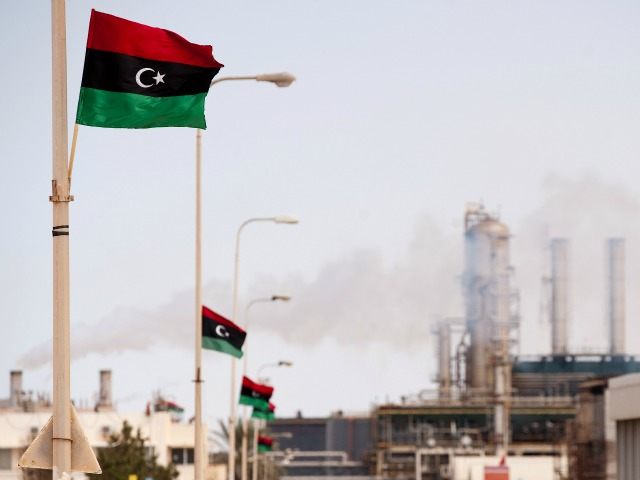 In 2011, the North Atlantic Treaty Organization (NATO) secured the approval of the United Nations Security Council to intervene in Libya to prevent Muammar Gaddafi from slaughtering civilians. Gaddafi was in the midst of a widespread revolt after he used violence against demonstrators that were inspired by the Arab Spring, which by that point rocked Tunisia and Egypt. However, NATO quickly moved from protecting civilians via no fly zones to regime change and in October 2011, anti-government rebels caught up to Gaddafi and executed him. Although President Obama wanted to avoid another Iraq, that is what transpired in Libya except this time no U.S. forces were committed to postwar reconstruction. Instead, Libya gradually devolved into political in-fighting and civil war and much like Iraq and Syria today, the country is under threat from the Islamic State, which is attempting to establish a foothold in the North African country to strike out at Libya’s neighbors and across the Mediterranean at Europe. Last week, in a speech at the National Defense University in Washington, President Barack Obama said that the biggest mistake of his presidency was not planning the reconstruction of Libya better, but there are some signs that things could improve. For example, the leader of a UN-approved government, Fayez al-Serraj, arrived last week to serve as Libya’s new prime minister and quickly won over some Tripoli militias and the loyalty of the heads of the central bank and national oil company. Still, al-Serraj has a tough road ahead of him to get Libya running smoothly again and he must handle militias, win over opposition legislators, and secure more economic support from the West so that Libya does not become a “Somalia on the Mediterranean” that Western policy analysts most fear.
In 2011, the North Atlantic Treaty Organization (NATO) secured the approval of the United Nations Security Council to intervene in Libya to prevent Muammar Gaddafi from slaughtering civilians. Gaddafi was in the midst of a widespread revolt after he used violence against demonstrators that were inspired by the Arab Spring, which by that point rocked Tunisia and Egypt. However, NATO quickly moved from protecting civilians via no fly zones to regime change and in October 2011, anti-government rebels caught up to Gaddafi and executed him. Although President Obama wanted to avoid another Iraq, that is what transpired in Libya except this time no U.S. forces were committed to postwar reconstruction. Instead, Libya gradually devolved into political in-fighting and civil war and much like Iraq and Syria today, the country is under threat from the Islamic State, which is attempting to establish a foothold in the North African country to strike out at Libya’s neighbors and across the Mediterranean at Europe. Last week, in a speech at the National Defense University in Washington, President Barack Obama said that the biggest mistake of his presidency was not planning the reconstruction of Libya better, but there are some signs that things could improve. For example, the leader of a UN-approved government, Fayez al-Serraj, arrived last week to serve as Libya’s new prime minister and quickly won over some Tripoli militias and the loyalty of the heads of the central bank and national oil company. Still, al-Serraj has a tough road ahead of him to get Libya running smoothly again and he must handle militias, win over opposition legislators, and secure more economic support from the West so that Libya does not become a “Somalia on the Mediterranean” that Western policy analysts most fear.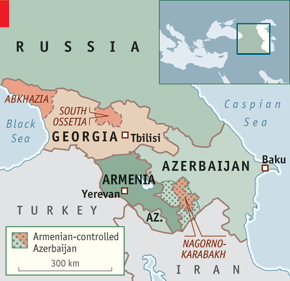 Last weekend fighting resumed between Armenian separatists and Azerbaijan-backed forces in the disputed region of Nagorno-Karabakh. The remote territory, located within Azerbaijan territory, is largely Armenian in ethnic composition and since 1994 it has been controlled by rebels that wish to detach it from Azerbaijan and make it an independent entity. Azerbaijan has long wished to regain it, but anxiety about how a takeover would be perceived by Armenians in the area, as well as the strong defensive position of separatist forces has prevented it from taking action up to now. Why the current fighting began is still a mystery as both sides accuse the other of taking offensive action first. While it would be easy to dismiss the conflict as a local affair, Turkey and Russia, both of whom are still smarting over a confrontation in Syria last fall, back opposite sides in the conflict, with Turkey casting its lot behind Muslim Azerbaijan and Russia having a defense treaty with Christian Armenia. Although the conflict appeared to be winding down as of the time of this brief, it could flare up again in the near future and create much more instability in Europe’s borderlands.
Last weekend fighting resumed between Armenian separatists and Azerbaijan-backed forces in the disputed region of Nagorno-Karabakh. The remote territory, located within Azerbaijan territory, is largely Armenian in ethnic composition and since 1994 it has been controlled by rebels that wish to detach it from Azerbaijan and make it an independent entity. Azerbaijan has long wished to regain it, but anxiety about how a takeover would be perceived by Armenians in the area, as well as the strong defensive position of separatist forces has prevented it from taking action up to now. Why the current fighting began is still a mystery as both sides accuse the other of taking offensive action first. While it would be easy to dismiss the conflict as a local affair, Turkey and Russia, both of whom are still smarting over a confrontation in Syria last fall, back opposite sides in the conflict, with Turkey casting its lot behind Muslim Azerbaijan and Russia having a defense treaty with Christian Armenia. Although the conflict appeared to be winding down as of the time of this brief, it could flare up again in the near future and create much more instability in Europe’s borderlands. On March 22 the Belgian capital of Brussels was rocked by two suicide attacks. One took place at the American Airlines counter at Zaventern airport and the other took place at a nearby subway station. As of the time of this brief, at least thirty-one people were reported killed and another 270 were reported wounded. The Islamic State quickly claimed responsibility for the attacks and investigators wonder if there was a link between the attack and the arrest of Salah Abdeslam, considered the lone survivor of the Paris terror attacks last year. Belgium has acquired a reputation as a terror hotbed of Europe, with militants using Brussels and other Belgian cities as planning centers for other attacks throughout Europe and the world. The attacks will likely cause the Belgian government to bolster its security infrastructure and rethink some of its policies regarding the integration of immigrants from Islamic nations. And the attacks will likely bolster a right-wing critique of existing security policies within the European Union (EU) that they say make the continent more vulnerable to attack.
On March 22 the Belgian capital of Brussels was rocked by two suicide attacks. One took place at the American Airlines counter at Zaventern airport and the other took place at a nearby subway station. As of the time of this brief, at least thirty-one people were reported killed and another 270 were reported wounded. The Islamic State quickly claimed responsibility for the attacks and investigators wonder if there was a link between the attack and the arrest of Salah Abdeslam, considered the lone survivor of the Paris terror attacks last year. Belgium has acquired a reputation as a terror hotbed of Europe, with militants using Brussels and other Belgian cities as planning centers for other attacks throughout Europe and the world. The attacks will likely cause the Belgian government to bolster its security infrastructure and rethink some of its policies regarding the integration of immigrants from Islamic nations. And the attacks will likely bolster a right-wing critique of existing security policies within the European Union (EU) that they say make the continent more vulnerable to attack.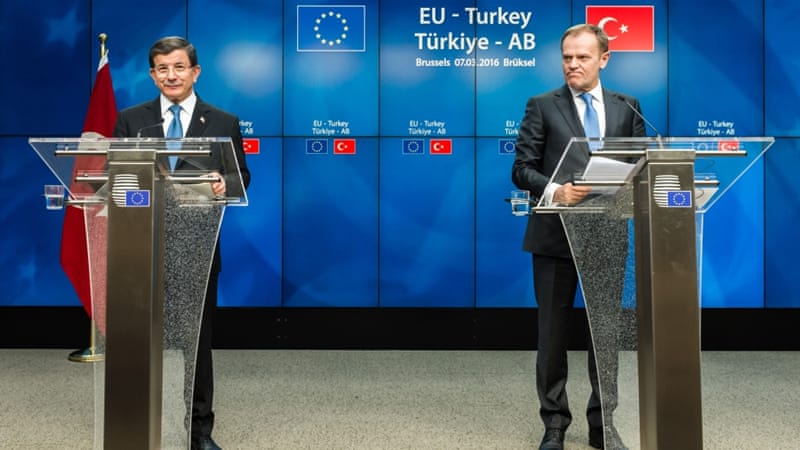 The European migrant crisis was arguably the biggest international news story of 2015. More than a million migrants poured into Europe last year, fleeing violence in Syria, Iraq, Afghanistan, and Libya. At first, European leaders such as German Chancellor Angela Merkel were welcoming of refugees, but the sheer number of new arrivals overwhelmed countries such as Greece and triggered a backlash, especially among conservatives that feared that the flood would radically alter Europe’s demographics and culture. The Parisian terror attacks in November, as well as accusations that refugees attacked women in Cologne, Germany, bolstered the case for limiting new arrivals and it appears that the European Union (EU) has reached a deal with Turkey to do just that. The deal calls for Turkey to take in refugees that fail to acquire asylum in Europe, while Europe will provide billions in aid for Turkey to deal with refugees. Also, Turkey’s aspirations of joining the EU have been revived, with the EU pledging to open new chapters in those delayed negotiations and promising that Turkish nationals will have access to the organization’s visa-free travel zone by June. However, skeptics say that this deal is unworkable from a logistics and legal point-of-view. They argue that Turkey is not safe for migrants and that the EU is absconding of its responsibility to help the world’s less fortunate.
The European migrant crisis was arguably the biggest international news story of 2015. More than a million migrants poured into Europe last year, fleeing violence in Syria, Iraq, Afghanistan, and Libya. At first, European leaders such as German Chancellor Angela Merkel were welcoming of refugees, but the sheer number of new arrivals overwhelmed countries such as Greece and triggered a backlash, especially among conservatives that feared that the flood would radically alter Europe’s demographics and culture. The Parisian terror attacks in November, as well as accusations that refugees attacked women in Cologne, Germany, bolstered the case for limiting new arrivals and it appears that the European Union (EU) has reached a deal with Turkey to do just that. The deal calls for Turkey to take in refugees that fail to acquire asylum in Europe, while Europe will provide billions in aid for Turkey to deal with refugees. Also, Turkey’s aspirations of joining the EU have been revived, with the EU pledging to open new chapters in those delayed negotiations and promising that Turkish nationals will have access to the organization’s visa-free travel zone by June. However, skeptics say that this deal is unworkable from a logistics and legal point-of-view. They argue that Turkey is not safe for migrants and that the EU is absconding of its responsibility to help the world’s less fortunate. Last week’s Iranian elections were billed as the most significant in decades as reformist, moderate, and conservative candidates vied for seats in the nation’s parliament (called the Majlis) and its Assembly of Experts, the body that selects the nation’s Supreme Leader. The elections appeared to be a triumph for moderate President Hassan Rouhani, with reformist and moderate candidates sweeping all of the seats in Tehran and returning to the Majlis for the first time since 2012. Moderate candidates also did well in the Assembly of Experts elections, apparently winning fifty-one of the eighty-eight available seats. In a campaign that was marred by accusations of Western interference by the nation’s conservatives, Rouhani successfully rallied Iranians around the benefits of the recent nuclear deal and appears poised to push for more economic and social reforms before Iran holds its presidential election next year. This could make Iran a growing superpower in the Middle East, but extempers should be cautious of reading too much significance into the elections as hardliners continue to control the Islamic Republic’s primary institutions.
Last week’s Iranian elections were billed as the most significant in decades as reformist, moderate, and conservative candidates vied for seats in the nation’s parliament (called the Majlis) and its Assembly of Experts, the body that selects the nation’s Supreme Leader. The elections appeared to be a triumph for moderate President Hassan Rouhani, with reformist and moderate candidates sweeping all of the seats in Tehran and returning to the Majlis for the first time since 2012. Moderate candidates also did well in the Assembly of Experts elections, apparently winning fifty-one of the eighty-eight available seats. In a campaign that was marred by accusations of Western interference by the nation’s conservatives, Rouhani successfully rallied Iranians around the benefits of the recent nuclear deal and appears poised to push for more economic and social reforms before Iran holds its presidential election next year. This could make Iran a growing superpower in the Middle East, but extempers should be cautious of reading too much significance into the elections as hardliners continue to control the Islamic Republic’s primary institutions.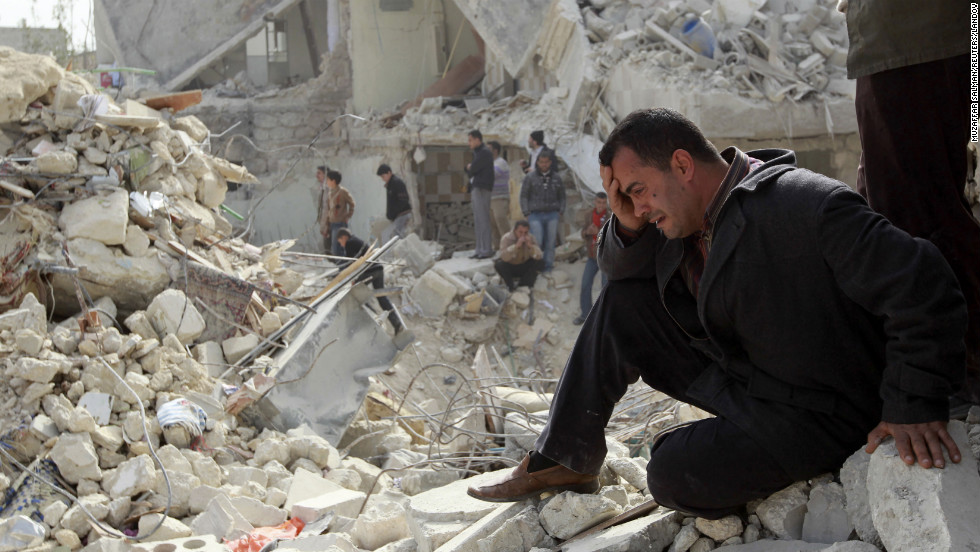 In less than a month, the war in Syria will be entering its fifth year. The conflict has led to the deaths of more than 250,000 people, injured more than a million others, and displaced half of the country’s population. Syrian President Bashar al-Assad appeared headed for defeat in the fall, but the intervention of Russia rescued his regime and has allowed him to reverse the momentum of the conflict. President Barack Obama has refused to provide sufficient support for Syria’s rebel factions, hesitant to get America involved in another sectarian war in the region and despairing that there are no “good” forces to support in the conflict. Experts note that the war has become a proxy battle of American and Russian influence in the Middle East and that a wider war cannot be discounted between Sunni and Shi’ite powers. The United States and Russia have recently agreed to move toward a “cessation of hostilities” later this week, but the agreement excludes attacks on terrorist groups and the tortured nature of that term is likely to help Assad solidify his gains and potentially win the war with significant ramifications for U.S. foreign policy in the Middle East.
In less than a month, the war in Syria will be entering its fifth year. The conflict has led to the deaths of more than 250,000 people, injured more than a million others, and displaced half of the country’s population. Syrian President Bashar al-Assad appeared headed for defeat in the fall, but the intervention of Russia rescued his regime and has allowed him to reverse the momentum of the conflict. President Barack Obama has refused to provide sufficient support for Syria’s rebel factions, hesitant to get America involved in another sectarian war in the region and despairing that there are no “good” forces to support in the conflict. Experts note that the war has become a proxy battle of American and Russian influence in the Middle East and that a wider war cannot be discounted between Sunni and Shi’ite powers. The United States and Russia have recently agreed to move toward a “cessation of hostilities” later this week, but the agreement excludes attacks on terrorist groups and the tortured nature of that term is likely to help Assad solidify his gains and potentially win the war with significant ramifications for U.S. foreign policy in the Middle East. For American policymakers, Saudi Arabia is deemed as one of the pillars of stability in the Middle East. Despite its export of Wahhabist Islam and its suppression of democratic and gender rights, the kingdom has anchored the interests of Sunni Muslims in the region for the last six decades. Saudi Arabia has also been a reliable American ally, assisting in the Persian Gulf War of 1990-1991 and offering ideas for solving the Israeli-Palestinian dispute. The House of Saud’s leadership in global oil markets has been valuable as well, with the country serving as the de facto leader of the Oil and Petroleum Exporting Countries (OPEC) cartel. However, the growing strength of Iran over the last decade has created significant anxieties in Saudi ranks. With the decline of Western sanctions against the Islamic Republic it is possible that the Iranian economy could overtake Saudi Arabia’s in the long-term, and low oil prices are forcing the kingdom to make choices about how it can sustain its social model without provoking unrest in the coming years. These Saudi anxieties could prove harmful for the Middle East, especially if they cause the regime to engage in risky interventions and some of this is already taking place in Syria and Yemen.
For American policymakers, Saudi Arabia is deemed as one of the pillars of stability in the Middle East. Despite its export of Wahhabist Islam and its suppression of democratic and gender rights, the kingdom has anchored the interests of Sunni Muslims in the region for the last six decades. Saudi Arabia has also been a reliable American ally, assisting in the Persian Gulf War of 1990-1991 and offering ideas for solving the Israeli-Palestinian dispute. The House of Saud’s leadership in global oil markets has been valuable as well, with the country serving as the de facto leader of the Oil and Petroleum Exporting Countries (OPEC) cartel. However, the growing strength of Iran over the last decade has created significant anxieties in Saudi ranks. With the decline of Western sanctions against the Islamic Republic it is possible that the Iranian economy could overtake Saudi Arabia’s in the long-term, and low oil prices are forcing the kingdom to make choices about how it can sustain its social model without provoking unrest in the coming years. These Saudi anxieties could prove harmful for the Middle East, especially if they cause the regime to engage in risky interventions and some of this is already taking place in Syria and Yemen. More than a year after the Ebola virus terrified the world, a new virus is instilling fear into the hearts of millions of citizens throughout the Western Hemisphere. The culprit this time is the Zika virus, a mosquito-borne pathogen that was ignored by health experts for decades. However, a spike in the number of births of children with microcephaly, a rare condition that leads to babies being born with abnormally small heads, to women that are thought to have been infected with the virus has created a renewed sense of urgency in the global health community. Zika is not native to the Western Hemisphere and it was first found in Africa more than sixty years ago. Its spread is a testament to how the world is increasingly one without borders when it comes to health issues and Zika creates yet another headache for Brazil, a nation facing significant economic problems and that is hosting the Summer Olympics this year.
More than a year after the Ebola virus terrified the world, a new virus is instilling fear into the hearts of millions of citizens throughout the Western Hemisphere. The culprit this time is the Zika virus, a mosquito-borne pathogen that was ignored by health experts for decades. However, a spike in the number of births of children with microcephaly, a rare condition that leads to babies being born with abnormally small heads, to women that are thought to have been infected with the virus has created a renewed sense of urgency in the global health community. Zika is not native to the Western Hemisphere and it was first found in Africa more than sixty years ago. Its spread is a testament to how the world is increasingly one without borders when it comes to health issues and Zika creates yet another headache for Brazil, a nation facing significant economic problems and that is hosting the Summer Olympics this year. Although terrorism is not unknown in Indonesia, it had been seven years since the world’s largest Muslim nation was victimized by a large-scale terrorist attack. On Thursday, terrorists reportedly aligned with the Islamic State fired upon a busy shopping district in the capital of Jakarta, killing two people and wounding more than twenty others. Indonesian President Joko Widodo, also known as Jokowi, was quick to condemn the attacks and stated his nation’s resolve not to succumb to the extremist message that the Islamic State propagates. However, there are fears that the attack may be a sign of bigger aims by the Islamic State in Southeast Asia as the group is reportedly looking into ways to extend its reach to weaken international efforts against it in Iraq and Syria. The attacks have also called into question whether Indonesian authorities are doing enough to fight extremism and the radicalization of young Muslim men.
Although terrorism is not unknown in Indonesia, it had been seven years since the world’s largest Muslim nation was victimized by a large-scale terrorist attack. On Thursday, terrorists reportedly aligned with the Islamic State fired upon a busy shopping district in the capital of Jakarta, killing two people and wounding more than twenty others. Indonesian President Joko Widodo, also known as Jokowi, was quick to condemn the attacks and stated his nation’s resolve not to succumb to the extremist message that the Islamic State propagates. However, there are fears that the attack may be a sign of bigger aims by the Islamic State in Southeast Asia as the group is reportedly looking into ways to extend its reach to weaken international efforts against it in Iraq and Syria. The attacks have also called into question whether Indonesian authorities are doing enough to fight extremism and the radicalization of young Muslim men. Since 2013, the European Union (EU) has been worried about the outcome of a referendum on Great Britain’s EU membership. A member of the EU since 1973, Great Britain has often stood for a different set of ideas than its EU counterparts, preferring economic liberalism and less financial regulation than EU bureaucrats in Brussels and rival heads of state in Paris and Berlin. One of Prime Minister David Cameron’s promises upon winning the British parliamentary elections last year was to hold a referendum on Britain’s EU membership. This was interpreted as a sop to Conservative voters that bolted the party for the far-right United Kingdom Independence Party (UKIP), which is fiercely anti-EU. Although a date for the referendum has not been set, Cameron is hoping that he can secure concessions from the EU on immigrant welfare benefits and economic regulations that he can in turn sell to British voters to make an exit from the EU – termed a “Brexit” – unthinkable. Considering the fact that Britain’s exit from the EU would rob the organization of more than 10% of its population and more than 15% of its economic power and the fact that recent polls show support for a “Brexit” rising, extempers need to consider how they should approach “Brexit”-style questions in the coming months as their likelihood of being asked at tournaments should increase.
Since 2013, the European Union (EU) has been worried about the outcome of a referendum on Great Britain’s EU membership. A member of the EU since 1973, Great Britain has often stood for a different set of ideas than its EU counterparts, preferring economic liberalism and less financial regulation than EU bureaucrats in Brussels and rival heads of state in Paris and Berlin. One of Prime Minister David Cameron’s promises upon winning the British parliamentary elections last year was to hold a referendum on Britain’s EU membership. This was interpreted as a sop to Conservative voters that bolted the party for the far-right United Kingdom Independence Party (UKIP), which is fiercely anti-EU. Although a date for the referendum has not been set, Cameron is hoping that he can secure concessions from the EU on immigrant welfare benefits and economic regulations that he can in turn sell to British voters to make an exit from the EU – termed a “Brexit” – unthinkable. Considering the fact that Britain’s exit from the EU would rob the organization of more than 10% of its population and more than 15% of its economic power and the fact that recent polls show support for a “Brexit” rising, extempers need to consider how they should approach “Brexit”-style questions in the coming months as their likelihood of being asked at tournaments should increase.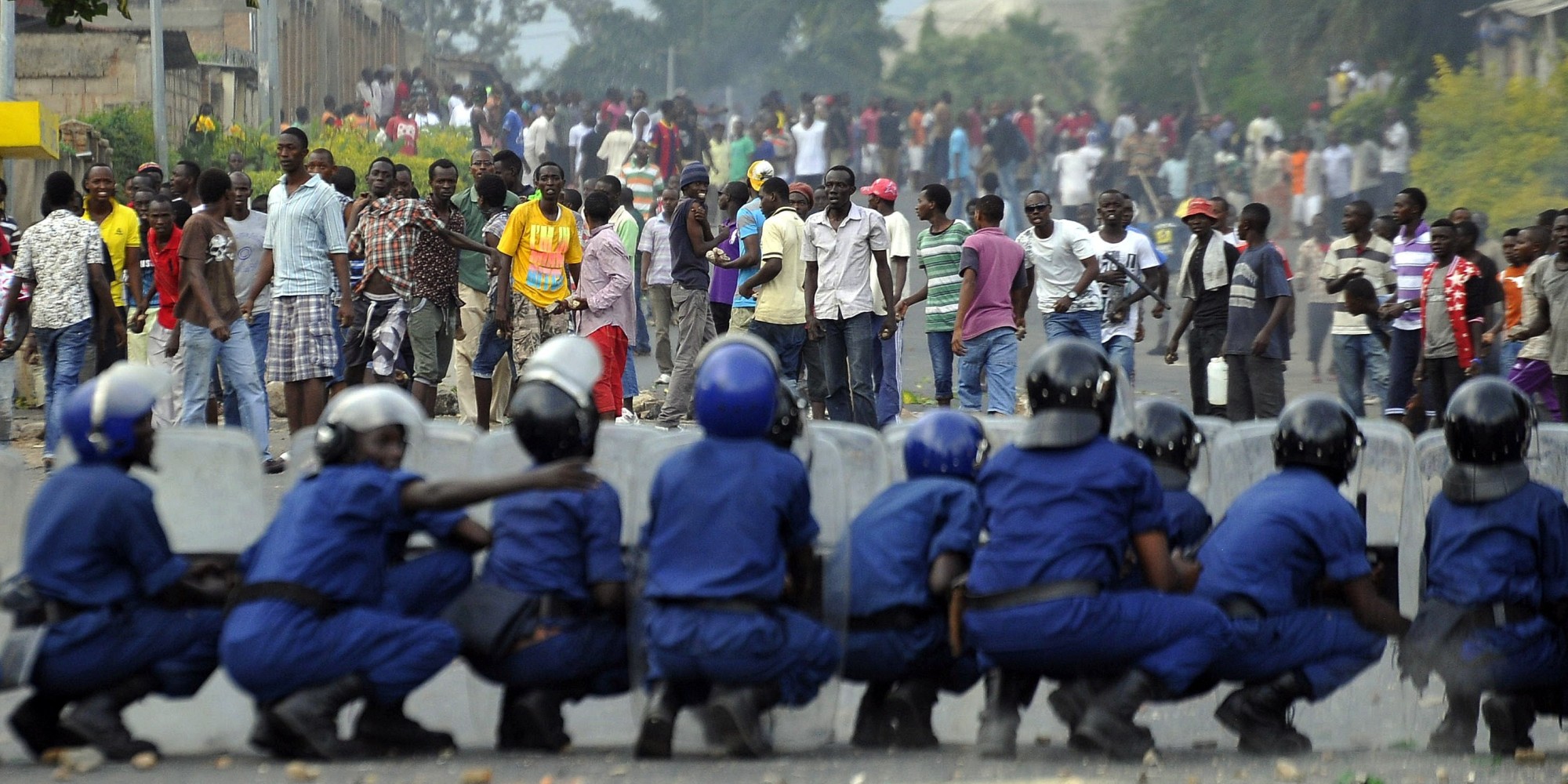 When it comes to the African continent extempers are used to talking about topics such as South Africa’s economy, the continent’s amazing economic potential in the twenty-first century, Chinese interests in the region, Robert Mugabe’s continued misrule of Zimbabwe, and conflict zones such as the Democratic Republic of Congo. What they have been less used to is talking about smaller African nations such as Burundi, but in light of significant political unrest extempers will probably be talking more about this country in the weeks and months ahead. Last April, President Pierre Nkurunziza announced that he would seek a third term. This would be normal under some democratic systems, but Burundi’s constitution, agreed to in 2006 after the end of a thirteen-year civil war, prohibits a president being elected to more than two terms. In light of Nkurunziza’s decision, opposition groups mounted several public protests and elements of the Burundian military sought to depose him in a coup in May. That attempt failed and since that time international observers have worried that Burundi is becoming a cauldron of political unrest, which could break down along ethnic lines and produce another mass genocide on the African continent reminiscent of what took place in Rwanda in 1994. Observers also worry about the radicalization of Burundian refugees and that the nation’s unrest could ignite a multi-national struggle between Burundi, Uganda, and Rwanda and their allies in East Africa. Additionally, Burundi’s unrest provides a test of the African Union’s (AU) ability to protect civilians populations in its member states and its willingness to prevent future crimes against humanity.
When it comes to the African continent extempers are used to talking about topics such as South Africa’s economy, the continent’s amazing economic potential in the twenty-first century, Chinese interests in the region, Robert Mugabe’s continued misrule of Zimbabwe, and conflict zones such as the Democratic Republic of Congo. What they have been less used to is talking about smaller African nations such as Burundi, but in light of significant political unrest extempers will probably be talking more about this country in the weeks and months ahead. Last April, President Pierre Nkurunziza announced that he would seek a third term. This would be normal under some democratic systems, but Burundi’s constitution, agreed to in 2006 after the end of a thirteen-year civil war, prohibits a president being elected to more than two terms. In light of Nkurunziza’s decision, opposition groups mounted several public protests and elements of the Burundian military sought to depose him in a coup in May. That attempt failed and since that time international observers have worried that Burundi is becoming a cauldron of political unrest, which could break down along ethnic lines and produce another mass genocide on the African continent reminiscent of what took place in Rwanda in 1994. Observers also worry about the radicalization of Burundian refugees and that the nation’s unrest could ignite a multi-national struggle between Burundi, Uganda, and Rwanda and their allies in East Africa. Additionally, Burundi’s unrest provides a test of the African Union’s (AU) ability to protect civilians populations in its member states and its willingness to prevent future crimes against humanity.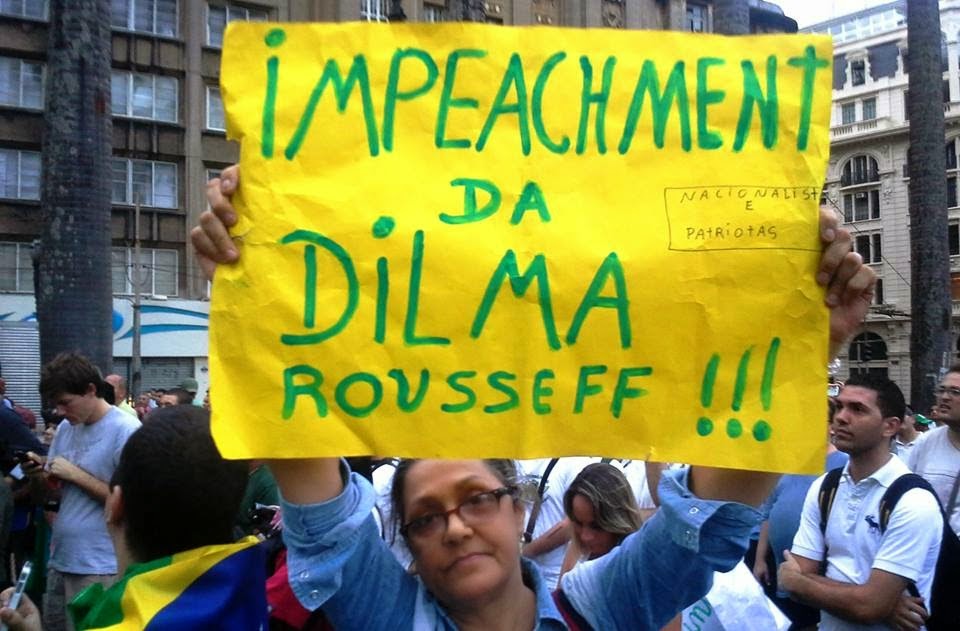 Once heralded as one of the strongest emerging economies, Brazil has seen its economic fortunes wane over the past year as a result of corruption scandals, fiscal management, and bureaucratic incompetence. The nation is in the midst of a recession – the longest downturn since the 1930s – and unemployment is nearing double digits. As if this was not bad enough, Brazil’s Congress is moving to remove President Dilma Rousseff on charges that she violated Brazil’s fiscal management laws by manipulating government finances to aid her re-election campaign last year. Congress may also move to look into whether Rousseff played any part in a scandal at the state-owned oil company Petrobras, as she was Brazil’s energy minister in former President Luiz Ignacio Lula da Silva’s government. While some investors have welcomed the move to impeach Rousseff – viewing her as an obstacle to sound economic management – other analysts worry that the impeachment controversy will be an unwelcome distraction as Brazil attempts to correct its present economic trajectory. Rousseff’s defenders argue that her prosecution is politically motivated and that Speaker Eduardo Cunha only initiated the proceedings after Rousseff’s Worker’s Party (PT) moved to oust him on charges of bribery and money-laundering.
Once heralded as one of the strongest emerging economies, Brazil has seen its economic fortunes wane over the past year as a result of corruption scandals, fiscal management, and bureaucratic incompetence. The nation is in the midst of a recession – the longest downturn since the 1930s – and unemployment is nearing double digits. As if this was not bad enough, Brazil’s Congress is moving to remove President Dilma Rousseff on charges that she violated Brazil’s fiscal management laws by manipulating government finances to aid her re-election campaign last year. Congress may also move to look into whether Rousseff played any part in a scandal at the state-owned oil company Petrobras, as she was Brazil’s energy minister in former President Luiz Ignacio Lula da Silva’s government. While some investors have welcomed the move to impeach Rousseff – viewing her as an obstacle to sound economic management – other analysts worry that the impeachment controversy will be an unwelcome distraction as Brazil attempts to correct its present economic trajectory. Rousseff’s defenders argue that her prosecution is politically motivated and that Speaker Eduardo Cunha only initiated the proceedings after Rousseff’s Worker’s Party (PT) moved to oust him on charges of bribery and money-laundering.